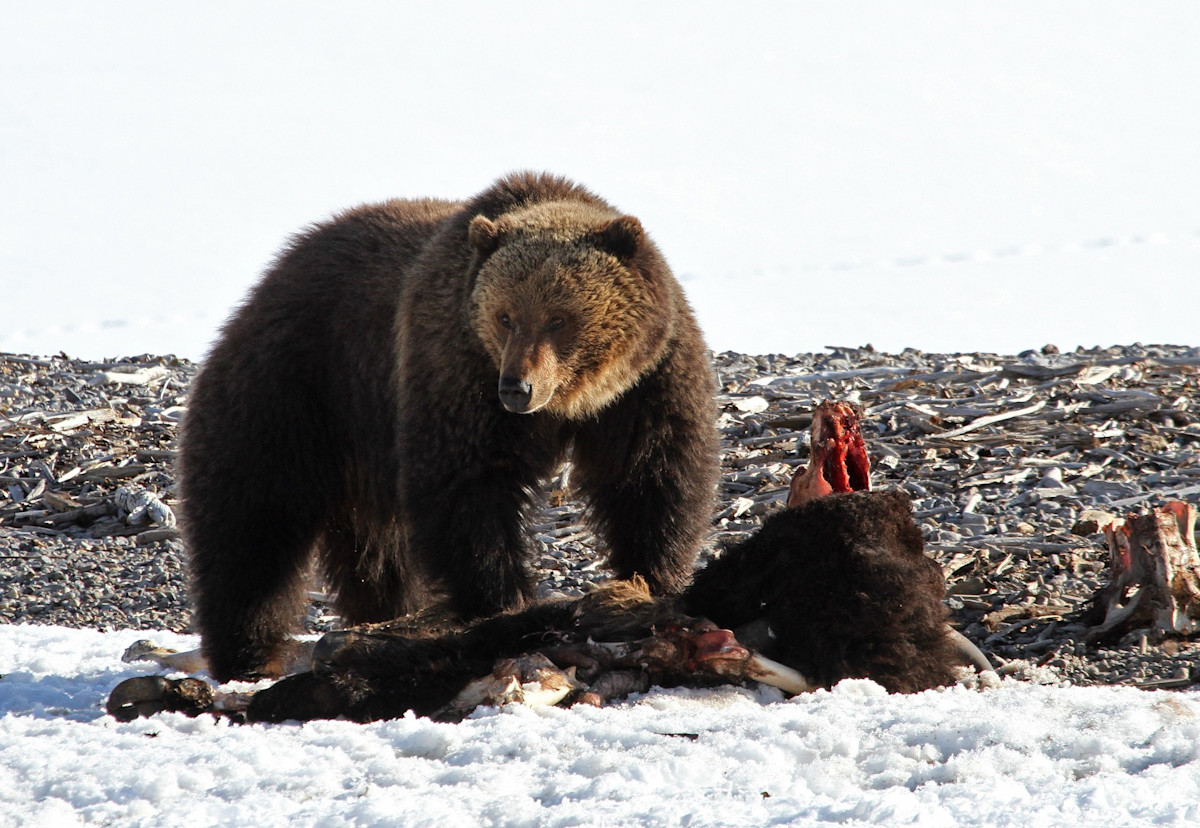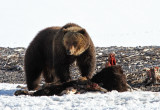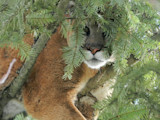
For thousands of years, humans have been fascinated and frightened by stories of wild animal attacks. Whenever someone tells one of these stories, they will often qualify it by saying that the odds of being killed by a large predator are less than that of being struck by lightning. For the vast majority of Americans who have never set foot in wild places where large predators like grizzly bears roam, that’s certainly true.
Often these attacks are chalked up as flukes. But hunters, anglers, hikers and campers naturally run a higher risk of being attacked. At MeatEater, we’ve learned to just accept that risk. We’ve all had our share of hairy run-ins with grizzly bears and even a few uncomfortable encounters with black bears, but on any given day it is statistically more dangerous to drive to the trailhead than it is to walk down the trail. There are common sense steps you can take to reduce the likelihood you’ll get caught up in a bad situation involving sharp teeth and claws, but in the end there’s no accounting for bad luck, ill-fated circumstances or random chance. Call it what you want, but there are just some things you can’t control out there.
Random or not, there’s an ongoing debate about whether attacks on humans by grizzly bears and other large predators are on the rise in North America. In 2018, it seemed new attacks were happening so often we couldn’t keep up with it all. Here’s a rundown of just some of the attacks that happened this year.
- In May, a grizzly bear researcher in Montana’s Cabinet Mountains was attacked and severely injured by a grizzly bear. She was able to deploy bear spray which drove the bear away, and she strongly believes that the effect of the spray saved her life. DNA evidence later determined the bear was a 24-year-old male that had been previously captured for research.
- In June, a grizzly bear killed one man and injured another two days later in Eagle River, Alaska. Three bears were killed near the attack sites but DNA evidence later confirmed they were not responsible for the attacks.
- In early July, a park ranger in British Columbia was repeatedly attacked in his yard by a sow grizzly with cubs. He suffered severe wounds but recovered. The bears were attracted by fruiting cherry trees. The sow and cubs were not killed because it was a defensive attack.
- In August, a 10-year-old boy suffered a non-fatal mauling by a sow grizzly bear in Yellowstone National Park. The attack occurred when his family surprised the bear on a hiking trail. They used bear spray effectively to drive away the sow. It was determined the bear was defending its cub and it was not killed.
- In early September, a hiker was attacked and injured by what was believed to be a grizzly bear in a remote area of Wyoming’s Beartooth Mountains, just south of the Montana border. The hiker was later airlifted to safety ands survived the attack. He was carrying bear spray but the attack happened so fast he was unable to use it to defend himself.
- Days later, a Jackson Hole, Wyoming hunting guide was killed by a grizzly in an attack involving a sow and juvenile cub. A second man who was being guided was also attacked but survived. The attack occurred while the two men were butchering an elk the hunter had killed the day before.
- Also in September, an incident took place on the Blackfeet Indian Reservation in Montana when a bowhunter and his hunting partner killed a grizzly bear that attacked him after he killed a moose. He suffered non-life threatening injuries. Two bears were later killed by wildlife officials.
- September saw another grizzly attack when a Montana archery hunter was attacked by a sow grizzly and a 2-year-old cub at the Blackleaf Wildlife Management Area. The hunter killed the sow and wounded the cub, which was later euthanized. He suffered non-fatal injuries in the attack.
- An 18-year-old miner was killed while working at a remote location on Alaska’s Admiralty Island. Mine employees later killed a sow brown bear and two cubs in the area of the attack.
- On October 13, a Montana hunter suffered serious injuries when he surprised a sow grizzly at close range. The bear, who was defending her cub, attacked him north of Yellowstone National Park. Both the victim and his hunting partner attempted to used bear spray during the attack.
- On Oct 26, a man identified as a “hiker” (he was actually a hunter) was attacked and severely mauled by a brown bear on Alaska’s Afognak Island. You can get the whole story from the man who was attacked on Ben O’Brien’s Hunting Collective Podcast.
- In late November, a woman and her infant daughter were killed by a grizzly bear in a tragic attack in a remote area of Canada’s Yukon Territory. The bear was killed by the woman’s husband.
Several mountain lions and black bears also attacked humans this year in North America:
- In May, a mountain lion killed one mountain biker and injured a second in Washington. The cougar was later killed by wildlife officials.
- Also in May, a 5-year-old Grand Junction, Colorado girl was attacked on her porch by a black bear. The girl was injured and taken to the hospital for treatment. Wildlife officials later tracked down and killed the bear.
- In early September, a woman hiking near Mount Hood was killed by a mountain lion in Oregon’s first ever fatal cougar attack. Wildlife officials failed to locate the mountain lion after the attack.
- Later in September, a Wisconsin hunter was attacked and injured by a black bear. The bear was killed by another hunter.
- The following month, a couple in Squamish, British Columbia suffered minor injuries after a black bear attacked them outside their home. The bear was trapped and relocated.
- Finally, just a couple weeks ago, a woman in Pennsylvania was attacked outside her house and dragged nearly one hundred yards by a black bear. She suffered significant injuries but is recovering. Because several bears were in the area, it was impossible to capture the bear responsible for the attack.
There’s a growing debate about whether hunting can play a role in reducing these types of encounters. In many places, grizzly, black bear and mountain lion populations are on the rise. As those populations grow, these predators will increasingly come into contact with a similarly expanding human population. There’s less and less space for wildlife and more and more people living and recreating around large predators. Wildlife management agencies are tasked with the tough decisions about how best to deal with these problems and the resulting conflicts. Hunting may factor more heavily into those decisions in the future.




